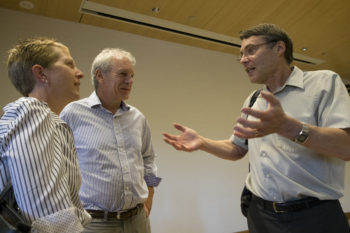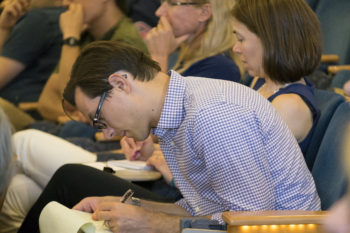TIES was a collaboration among CIRCLE and STEM departments to support faculty in transforming their courses through evidence-based pedagogies.
Background
The success of the AAU STEM Education Initiative in generating conversation and collaboration about teaching laid the groundwork for the Transformational Initiative for Education in STEM (TIES).

TIES draws from the work of Carl Wieman (Professor of Physics and of the Graduate School of Education, Stanford University; Associate Director for Science, White House Office of Science and Technology Policy, 2010-2012; Nobel Prize in Physics), who visited Washington University on August 22, 2016 to meet with the TIES project team and offer a public talk in which he discussed transforming STEM education, guided by insights from research on teaching and learning.
Find out more about Wieman’s work and its relationship with TIES in The Record.
Recent literature on curriculum development suggests that departments should be the focus of curricular innovations, and so in the pilot phase of TIES, Biology and Psychological and Brain Sciences will be the first departments to participate. After the pilot two additional departments will be selected to participate in TIES.
Objectives
In the pilot phase of TIES, CIRCLE staff and the TIES project team
- Worked with faculty in Biology and Psychological and Brain Sciences to improve student learning, performance and engagement by implementing evidence-based teaching strategies.
- Conducted evaluations to determine the impact of the strategies, especially on women and other demographics under-represented in STEM.
- Established a structure to support the departments in continuous program improvement.
- Continued to support faculty who are already implementing and evaluating evidence-based teaching strategies as part of the AAU project.
Model
 Our model for culture change is adapted from the Carl Wieman Science Education Initiative, which has been successful at two large research universities. As such, the TIES project team provided initial support to departments by
Our model for culture change is adapted from the Carl Wieman Science Education Initiative, which has been successful at two large research universities. As such, the TIES project team provided initial support to departments by
- supporting faculty as they introduce evidence-based teaching strategies to their courses,
- collaborating on course and project planning,
- collaborating with faculty on the design of evaluative studies, and
- helping to establish a faculty learning community focused on student learning.
At the heart of the model was the collaboration between TIES Education Specialists and CIRCE Faculty Collaborators. The TIES Education Specialists worked closely with faculty to redesign courses to utilize evidence-based teaching strategies and course design principles.
TIES Education Specialists: PhDs with expertise in the discipline are trained by CIRCLE to work as “embedded experts” with faculty to design, implement, and evaluate evidence-based teaching strategies.
CIRCLE Faculty Collaborators: Faculty refine their courses in collaboration with the TIES Education Specialists and present their work at faculty learning community events.
Courses
The TIES Education Specialists collaborated with CIRCLE Faculty Collaborators to refine their courses. TIES supported courses included:
- Biology 2960: Principles of Biology I
- Biology 2970: Principles of Biology II
- Biology 334: Cell Biology
- Psychology 100B: Introduction to Psychology
- Psychology 315: Introduction to Social Psychology
- Psychology 353: Psychology of Personality
- Psychology 354: Abnormal Psychology
Collaborators
Gina Frey (CIRCLE, Chemistry)
Mark McDaniel (CIRCLE, Psychological and Brain Sciences)
Kathy Miller (Biology)
April Bednarski (Biology)
Shaina Rowell (CIRCLE, Psychological and Brain Sciences)
Erin Solomon (CIRCLE)
Elise Walck-Shannon (CIRCLE, Biology)
Funding
The four-year pilot initiative was funded by the Office of the Provost.